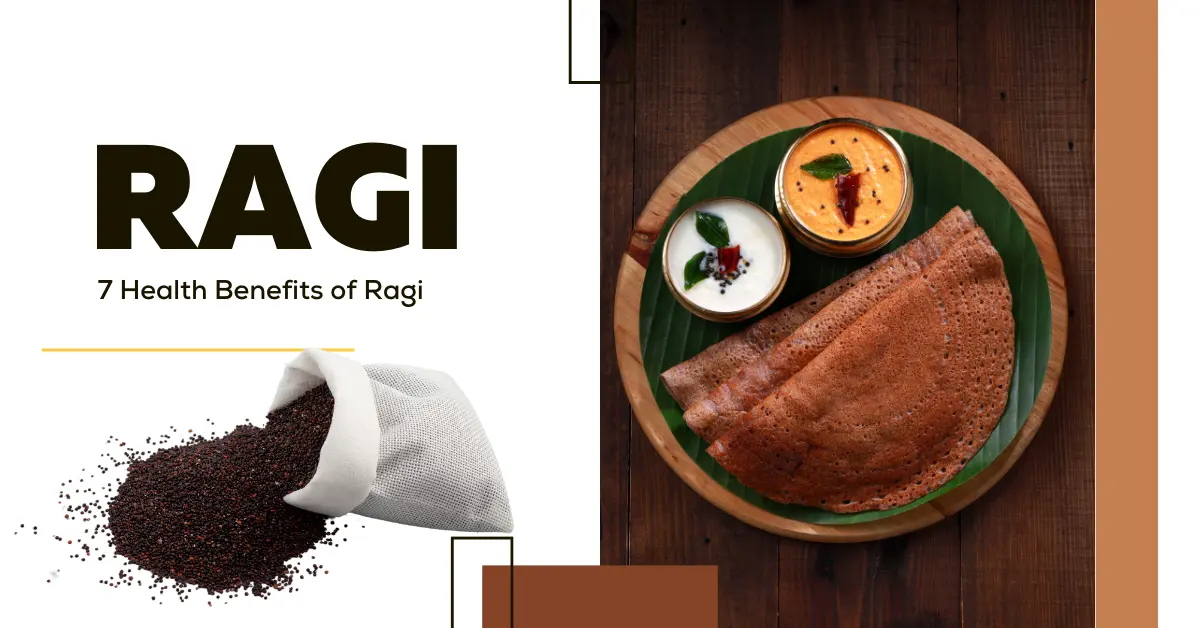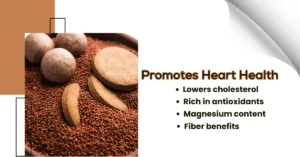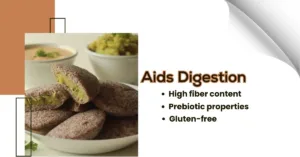
Ragi, also known as finger millet, is a nutritious grain popular in India. It’s packed with essential nutrients like calcium, iron, and fiber, making it a great choice for a healthy diet. Ragi is especially good for bone health due to its high calcium content, which strengthens bones and teeth. It also helps in weight management by keeping you full longer and supports digestion with its rich fiber content. Additionally, Ragi is gluten-free, making it an excellent option for those with gluten intolerance or celiac disease.
7 Health Benefits of Ragi
Ragi, also known as finger millet, is a small-seeded grain that’s been a staple food in many parts of Africa and Asia for thousands of years. It’s gaining popularity worldwide due to its impressive nutritional profile and many health benefits. Let’s take a closer look at seven ways ragi can improve your health and why you might want to add it to your diet.
Packed with Nutrients

Ragi is a nutrition powerhouse. It’s full of important vitamins and minerals that our bodies need to work well. Here’s what you can find in Ragi:
- Calcium: Ragi has more calcium than most other grains. This mineral is essential for healthy bones and teeth. It also allows your muscles & nerves to function appropriately.
- Iron: This grain is a good source of iron, which is important for making red blood cells. These cells carry oxygen around your body, keeping you energized and healthy.
- Fiber: Ragi is high in dietary fiber, which is great for your digestive system. Fiber helps you feel full, keeps your bowels regular, and can even lower cholesterol levels.
- Protein: While not as high in protein as some other grains, ragi still provide a decent amount. Protein is important for making and repairing tissues in your whole body.
- Other minerals: Ragi also contains phosphorus, potassium, and magnesium, all of which play important roles in keeping your body functioning well.
Adding ragi to your diet can help ensure you’re getting a good mix of these important nutrients.
Helps Control Blood Sugar

If you’re worried about diabetes or blood sugar levels, ragi might be a good grain choice for you. Here’s why:
- Low glycemic index: Foods with a low glycemic index don’t cause big spikes in blood sugar levels. Ragi has a lower glycemic index compared to many other grains, which means it releases sugar into your bloodstream slowly and steadily.
- High fiber content: The fiber in ragi also helps slow down digestion and the absorption of sugars, which further helps keep blood sugar levels stable.
- Polyphenols: These are plant compounds found in ragi that may help improve insulin sensitivity. This means your body can use insulin more effectively to control blood sugar.
Regular consumption of ragi as part of a balanced diet might help manage blood sugar levels and reduce the risk of type 2 diabetes.
Supports Weight Management

If you’re trying to maintain a healthy weight or lose a few pounds, ragi could be a helpful addition to your meals. Here’s how it can help:
- Low in calories: Ragi provides fewer calories compared to many other grains, which can be beneficial if you’re watching your calorie intake.
- High in fiber: The fiber in ragi helps you feel full for longer. This can decrease appetite and prevent overconsumption.
- Complex carbohydrates: Ragi is rich in complex carbs, which take longer to digest. This provides steady energy and helps avoid sudden hunger pangs.
Remember, no single food can make you lose weight. But including ragi as part of a balanced diet and healthy lifestyle can support your weight management goals.
Promotes Heart Health

Your heart works hard to keep you alive, and ragi can help keep it healthy. Here’s how:
- Lowers cholesterol: Some studies suggest that eating ragi regularly might help lower bad cholesterol levels in the blood. High cholesterol is a danger factor for heart disease.
- Rich in antioxidants: Ragi contains antioxidants that can help protect your heart from damage caused by harmful molecules called free radicals.
- Magnesium content: The magnesium in ragi helps maintain a healthy heart rhythm and blood pressure.
- Fiber benefits: The fiber in ragi can help lower cholesterol levels and reduce the risk of heart disease.
While more research is needed, including ragi in your diet could be a heart-smart choice.
Supports Bone Health

Strong bones are important for overall health, especially as we get older. Ragi can help keep your bones strong in several ways:
- High calcium content: Ragi is one of the best plant sources of calcium. This mineral is crucial for building and maintaining strong bones.
- Phosphorus: Ragi also contains phosphorus, another mineral important for bone health. Phosphorus works together with calcium to build strong bones and teeth.
- Other minerals: The magnesium and potassium in ragi also play roles in maintaining bone density.
Regular consumption of ragi, along with other calcium-rich foods and weight-bearing exercise, can help keep your bones strong and reduce the risk of conditions like osteoporosis.
Aids Digestion

A healthy digestive system is key to overall wellness, and ragi can help in this area too:
- High fiber content: The fiber in ragi helps keep your digestive system running smoothly. It can control constipation and stimulate regular bowel motions.
- Prebiotic properties: Some types of fiber in ragi act as prebiotics, which feed the good bacteria in your gut. This can improve your overall gut health.
- Gluten-free: For people with gluten sensitivity or celiac disease, ragi is a safe and nutritious grain option that won’t cause digestive upset.
Including ragi in your diet can help keep your digestive system happy and healthy.
Boosts Skin Health

Healthy skin isn’t just about what you put on it – what you eat matters too. Ragi can contribute to healthier skin in several ways:
- Antioxidants: The antioxidants in ragi can help protect your skin from damage caused by free radicals, which can lead to premature aging.
- Amino acids: Ragi contains amino acids that are important for collagen production. Collagen supports keep your skin soft, firm, and elastic.
- Vitamin D: Some varieties of ragi contain vitamin D, which is important for skin cell growth and repair.
While eating ragi alone won’t give you perfect skin, including it as part of a balanced diet can contribute to overall skin health.
How to Include Ragi in Your Diet
Now that you know about the health benefits of ragi, you might be wondering how to add it to your meals. Here are some ideas:
- Ragi flour can be used to make flatbreads and pancakes, or added to baked goods.
- Cooked ragi can be used as a base for porridge or added to soups and stews.
- Ragi malt, a powder made from sprouted ragi, can be mixed with milk or water for a nutritious drink.
- Ragi can be used to make traditional dishes like ragi mudde or ragi dosa.
Remember, while ragi is nutritious, it’s important to eat a variety of foods to get all the nutrients your body needs. If you have any health conditions or concerns, it’s always a good idea to talk to a healthcare professional or a registered dietitian before making significant changes to your diet.
In conclusion, ragi is a nutrient-dense grain that offers many health benefits. From supporting heart and bone health to aiding in digestion and blood sugar control, ragi can be a valuable addition to a healthy diet. Why not give this ancient grain a try and see how it can benefit your health?
FAQs
What are the main health benefits of Ragi?
Ragi is rich in calcium, which strengthens bones. It also contains fiber, aiding digestion, and helps manage blood sugar levels, making it great for overall health.
How does Ragi help with weight loss?
Ragi is high in fiber, which keeps you full for longer, reducing hunger pangs. This helps in controlling calorie intake and supports healthy weight management.
Is Ragi good for people with diabetes?
Yes, Ragi has a low glycemic index, meaning it releases sugar slowly into the bloodstream, helping maintain stable blood sugar levels and reducing spikes.
Can Ragi improve digestion?
Ragi is rich in dietary fiber, which promotes healthy digestion and prevents constipation. Its natural fibers help in maintaining a healthy gut and regular bowel movements.
Is Ragi good for bone health?
Yes, Ragi is an excellent source of calcium, which is essential for strong bones and teeth. Regular consumption can help prevent osteoporosis and strengthen bones.
Also Read:
7 Amazing Health Benefits of Ashwagandha
7 Amazing Health Benefits of Millets
References:
https://www.ncbi.nlm.nih.gov/pmc/articles/PMC4033754/
https://pubmed.ncbi.nlm.nih.gov/23522794/
https://pubmed.ncbi.nlm.nih.gov/29595341/
Disclaimer: The information provided in this blog about the health benefits of ragi is for educational purposes only and should not be considered medical advice. Consult a healthcare provider before making significant changes to your diet or using ragi for health purposes.
Related post

7 Health Benefits of Assam Tea


